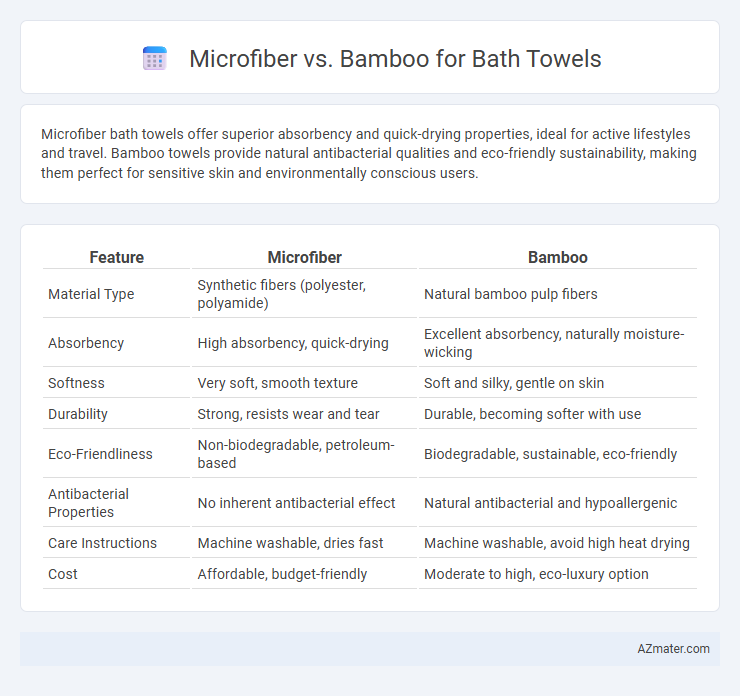Microfiber bath towels offer superior absorbency and quick-drying properties, ideal for active lifestyles and travel. Bamboo towels provide natural antibacterial qualities and eco-friendly sustainability, making them perfect for sensitive skin and environmentally conscious users.
Table of Comparison
| Feature | Microfiber | Bamboo |
|---|---|---|
| Material Type | Synthetic fibers (polyester, polyamide) | Natural bamboo pulp fibers |
| Absorbency | High absorbency, quick-drying | Excellent absorbency, naturally moisture-wicking |
| Softness | Very soft, smooth texture | Soft and silky, gentle on skin |
| Durability | Strong, resists wear and tear | Durable, becoming softer with use |
| Eco-Friendliness | Non-biodegradable, petroleum-based | Biodegradable, sustainable, eco-friendly |
| Antibacterial Properties | No inherent antibacterial effect | Natural antibacterial and hypoallergenic |
| Care Instructions | Machine washable, dries fast | Machine washable, avoid high heat drying |
| Cost | Affordable, budget-friendly | Moderate to high, eco-luxury option |
Understanding Microfiber and Bamboo Materials
Microfiber towels are made from ultra-fine synthetic fibers, typically a blend of polyester and polyamide, offering exceptional softness, high absorbency, and quick-drying properties ideal for bath use. Bamboo towels are crafted from bamboo pulp fibers, known for their natural antibacterial qualities, eco-friendliness, and silky texture that enhances skin comfort. Comparing these materials highlights microfiber's durability and rapid moisture-wicking against bamboo's sustainable sourcing and gentle, hypoallergenic benefits for sensitive skin.
Absorbency: Microfiber vs Bamboo Bath Towels
Microfiber bath towels excel in absorbency due to their ultra-fine synthetic fibers, which can hold up to seven times their weight in water, making them ideal for quick drying. Bamboo bath towels also offer strong absorbency benefits, absorbing moisture efficiently thanks to their natural cellulose structure while being naturally antimicrobial and resistant to odor. Comparing absorbency, microfiber dries faster, while bamboo provides a soft, breathable, and eco-friendly option with competitive water retention.
Softness and Comfort Comparison
Microfiber bath towels offer exceptional softness due to their ultra-fine synthetic fibers, which trap heat and moisture efficiently for a cozy feel. Bamboo towels provide natural softness accompanied by breathability and hypoallergenic properties, enhancing comfort for sensitive skin. Both materials deliver a plush experience, but bamboo excels in moisture-wicking and eco-friendly benefits, while microfiber is quicker drying and highly durable.
Durability and Longevity
Microfiber bath towels offer high durability due to their tightly woven synthetic fibers, resisting wear and tear over long-term use. Bamboo towels, while naturally antibacterial and eco-friendly, may have slightly lower tensile strength but maintain softness and resist pilling with proper care. Choosing between microfiber and bamboo for longevity depends on prioritizing synthetic fiber resilience or sustainable, natural material benefits.
Eco-Friendliness and Sustainability
Bamboo bath towels offer superior eco-friendliness due to bamboo's rapid growth rate and minimal pesticide requirement, making it a highly renewable resource. Microfiber towels, although durable and quick-drying, are made from synthetic materials like polyester and nylon, which contribute to microplastic pollution and have a larger carbon footprint. Choosing bamboo towels supports sustainable agriculture and biodegradable textiles, reducing environmental impact in bath towel consumption.
Drying Speed and Practical Use
Microfiber bath towels excel in drying speed due to their fine synthetic fibers, which absorb water quickly and evaporate moisture faster than bamboo towels. Bamboo towels, while naturally antibacterial and eco-friendly, tend to dry slower because of their thicker, natural fibers retaining more water. In practical use, microfiber towels are ideal for quick drying post-shower or travel, whereas bamboo towels offer superior softness and sustainability for everyday home use.
Maintenance and Care Requirements
Microfiber bath towels require low maintenance, drying quickly and resisting mildew due to their synthetic fibers, but they should be washed in cold water without fabric softeners to maintain absorbency. Bamboo towels, made from natural fibers, need gentle washing in mild detergent and air drying or low heat to preserve their softness and antibacterial properties. Both materials benefit from avoiding high heat and harsh chemicals to extend their lifespan and maintain optimal performance.
Hypoallergenic and Skin Sensitivity Factors
Microfiber towels offer excellent hypoallergenic properties by repelling dust mites and reducing allergens, making them suitable for sensitive skin. Bamboo towels naturally possess antimicrobial and hypoallergenic qualities due to their organic fibers, which help prevent irritation and promote skin health. Both materials are gentle on sensitive skin, but bamboo's natural breathability may provide enhanced comfort for individuals prone to skin sensitivities.
Price Comparison: Which Offers Better Value?
Microfiber bath towels typically cost between $5 and $15, offering affordability and quick-drying properties, while bamboo towels range from $15 to $30, reflecting their natural antibacterial qualities and eco-friendly appeal. Despite the higher upfront price, bamboo towels provide long-term value through durability and sustainable benefits, whereas microfiber towels excel in budget-conscious settings with frequent replacement needs. Evaluating the balance between initial cost, longevity, and environmental impact determines which material delivers better value for individual user priorities.
Which Bath Towel Material is Best for You?
Microfiber bath towels offer superior absorbency and quick-drying properties, making them ideal for busy lifestyles or gym use, while bamboo towels excel in softness, natural antibacterial qualities, and eco-friendliness, perfect for sensitive skin and sustainable living. Consider microfiber if you prioritize durability and moisture-wicking performance, whereas bamboo suits those seeking a plush, hypoallergenic option with environmental benefits. Your choice depends on balancing factors like drying speed, texture, sustainability, and skin sensitivity to find the best bath towel material for your daily routine.

Infographic: Microfiber vs Bamboo for Bath Towel
 azmater.com
azmater.com